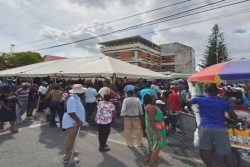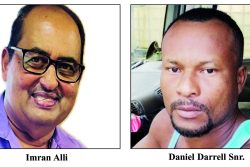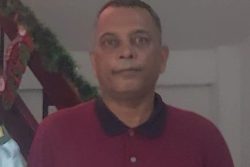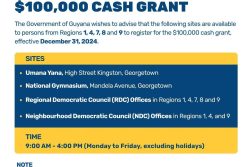On February 26, 1997, this newspaper published an editorial captioned ‘Tell the people.’ It said: “We recognize that among the other things prompting… reticence will be the need of a family to preserve a measure of privacy at a time of acute distress. If the President were simply an ordinary private citizen from Port Mourant, the family members would have every right to such privacy. The problem is, the President of Guyana is not a private citizen, he is a public figure with a vital constitutional role. In a democracy, the right of the people to know the truth about the condition of a President whom they elected to office, must override the right to privacy of the immediate family.”
Readers will recognize that this extract refers to the period of President Cheddi Jagan’s illness, when the public was fed a misleading diet of optimistic official bulletins containing no medical information of even a general kind which would have allowed for a realistic assessment of his state of health. As is also evident from the above, the argument impliedly put forward by the government for keeping citizens in the dark about the seriousness of Dr Jagan’s heart attack, was his right, and that of his family, to privacy.
While Mr Robert Corbin, the Leader of the PNCR, is not a head of state or government, he has been elected by the people of this country to fill a constitutional post, namely, that of Leader of the Opposition. His salary and benefits are paid for by the taxpayers of this nation, and like the late Dr Jagan, he is a long way from being a private citizen. Yet once again no information has been made available about his illness, despite the fact that on this occasion the taxpayers footed the bill for him to be medivacked to the United States, and to receive treatment there. Once again, the argument which has been put forward for withholding data on Mr Corbin’s health status, is that of privacy.
First of all, the issue here is not about the state footing the bill for his medical expenses, concerning which there is no contention. Secondly, it must be said, everyone wishes him a full and speedy recovery. Thirdly, at a practical level it seems futile for the family to try and keep his condition secret, if only because concealment is almost impossible nowadays in an open society like the United States. As such, therefore, some details about the Opposition Leader’s condition have been unofficially in circulation for some time, although whether they are fully accurate no one except his immediate relatives and perhaps the senior members of his party will have any idea. One cannot think, however, that they would really prefer unofficial accounts of the procedures Mr Corbin has undergone – which may or may not be correct in every particular – to be disseminated, rather than reliable official information which is based on bulletins issued by the medical facility which has treated him.
As it is, US hospitals routinely issue bulletins on the state of health of public figures, often in some detail. The most recent example is that of Senator Edward Kennedy, the specifics of whose encounter with brain cancer have been made freely available to the nation. There was no attempt by the Kennedy family either, to keep secret the deteriorating health of Jacqueline Kennedy Onassis prior to her death some years ago, and in her case it was not even as if she had any connection at all with government at that stage. However, as the widow of President John Kennedy and a greatly admired member of the high-profile Kennedy clan, both she and the family understood their obligations to the public, despite her natural inclination for reclusiveness.
It was Ms Fidela Corbin who in a letter to this newspaper last week (‘Mr Corbin’s medical condition is a privacy matter,’ May 21) argued that the principle of doctor-patient confidentiality applied in the case of her father, and that this principle was paramount with only limited exceptions. Exactly what those exceptions were, she never elaborated on. However, she made it clear that the Leader of the Opposition was not one of them. “I strongly disagree,” she wrote, “that the right to privacy of medical records is outweighed by pure curiosity, or in Guyanese parlance, ‘fastness.’” In the first place, no one is asking for the disclosure of “medical records” per se; simply information about Mr Corbin’s ailment and treatment. In the second place, to condemn the requests for accurate information as “fastness” when a significant percentage of the electorate has traditionally voted for the PNCR – on the last occasion with Mr Corbin as the party’s presidential candidate – is perhaps to treat the genuine concerns about his health that party supporters at least will have, with uncalled for disdain.
However, that is not the primary issue here. As said already, Mr Corbin, like Dr Cheddi Jagan before him, is not a private citizen. No matter what Ms Corbin thinks about the public’s “fastness” for wanting to know, or reporters’ ‘uncouthness’ for having the temerity to ask about her father’s health status, in a democracy citizens have a right to be told and the relevant family members or officials have an obligation to tell them. It is as straightforward as that. The condition of the Leader’s health has political implications for the PNCR and, by extension, constitutional ones for the nation at large; confidentiality simply cannot apply in this instance.
In another editorial which appeared in this newspaper on February 21, 1997, it was said: “When a President falls seriously ill it is a matter of national concern. The government or the ruling party should have no monopoly of the information relating to his illness. Indeed, in some democratic countries it is the practice to give detailed medical bulletins on the President’s health including, where necessary, diagrams and charts. The public have the right to know, on a timely basis, the condition of the head of state.” For President and head of state, read Leader of the Opposition.





